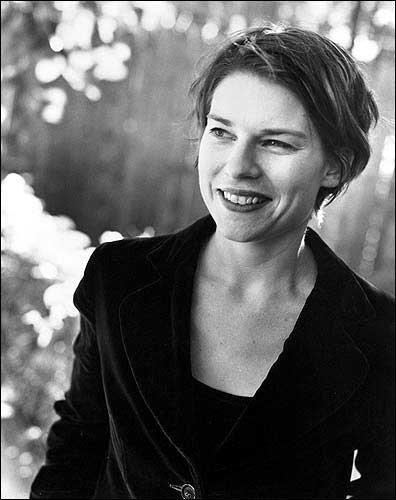
This installment of the Writers in Schools author questionnaire features fiction writer Maud Casey. A DC resident, Casey teaches creative writing at the University of Maryland and is the author of the novels Genealogy and The Shape of Things to Come as well as the collection of short fiction Drastic, which was the topic of discussion during Casey’s December 6th visit to Phelps ACE High School.
PEN/Faulkner: What’s been the most memorable thing about any of your visits to a WinS partner school?
Maud Casey: Each time I’ve visited a school, something delightfully unexpected happens in the classroom. It’s why visiting the schools is such a pleasure. Each time, a student asks a question that makes me think about my fiction in a way I never have before; each time, a student asks a question that makes me think about literature in a way I never have before. In other words, it’s hard to choose just one! During my most recent visit, a student who had been relatively quiet during most of the discussion raised his hand rather tentatively and asked whether I’d ever had the experience of having characters from a story I was working on take over and start speaking to me. It was clear he was asking the question because he had had this experience and he wanted to make sure this was supposed to happen, that he wasn’t nuts. It was a writer’s question. He seemed pretty relieved when I said yes. I was happy to provide the reality—anti-reality?—check.
P/F: When you were writing the book used by the WinS program, did you anticipate the book being read by high school students? Had you anticipated ever presenting work to those types of audiences?
MC: I never did, only because my influences were all writers writing for an adult audience. But that seems sort of silly now, come to think of it, since I read so many of those influences in high school. In any case, how could I imagine I’d get so lucky?
P/F: When did you first meet a living author? Was it in a scholastic context? Did it make an impression on you?
MC: Pretty early on. I was born in Iowa City because both of my parents were attending the Iowa Writers’ Workshop. They’re both writers of fiction, and other things as well, so I didn’t have to run away to join the circus and that was largely a blessing. The value of the imagination, of making stuff up, was never in question, and that made an enormous impression on me. Over the years, I’ve come to understand, and be deeply grateful for, what it is I’ve inherited from my writer parents, particularly in terms of the early permission to be a writer. As in, it is possible to dedicate your life to this quixotic adventure. They also showed me how difficult writing is, how lonely it can be. From a very early age, I understood writing to be hard work. Because growing up around writers, seeing them in all their flawed humanness, was such a gift to me, the mission of the WinS program is particularly dear to my heart.
P/F: What would you have been most curious to ask an author if you’d been part of a WinS visit when you were in high school?
MC: Is there no escape from you people? Kidding. I think I would have been really curious to find out how they started. How did they know it was possible assuming they weren’t surrounded by writers as I was? Again, this is where the mission of WinS is terrific—the modeling of that possibility. It’s such a brave thing to begin to write—it requires unusual mettle, particularly at the beginning.
P/F: You teach at the University of Maryland. What are the biggest differences you find in interacting with your undergrads and the high school students you encounter during WinS visits? In all of your teaching, what are your greatest goals for students?
MC: The high school students I’ve encountered are a little bolder in terms of asking difficult questions, I’ve found. I think this has to do with the armor of protective embarrassment that develops as we age. That said, what I enjoy about teaching undergraduates at Maryland that I also enjoy in the visits with the high school students is the students’ capacity for wonder. There’s a kind of useful innocence in relation to literature that is inspiring and reminds me of why I fell in love with reading and writing in the first place. I’d also add that one of things that has struck me on each of the WinS visits is how prepared the students are. They’re critical, thoughtful readers. Which segues into my greatest goals for my students. Cultivating critical, thoughtful reading skills is definitely one of them. That, and the art of revision. And finally, cultivating a sense of wonder in relation to literature. I hope to provide them with tools to take their work farther on their own but also never want them to forget that as much as there are nuts and bolts involved in this game, there’s also mystery and magic. As my writer mother once wisely told me, writing is “inchoate reaching in heartfelt darkness.”
